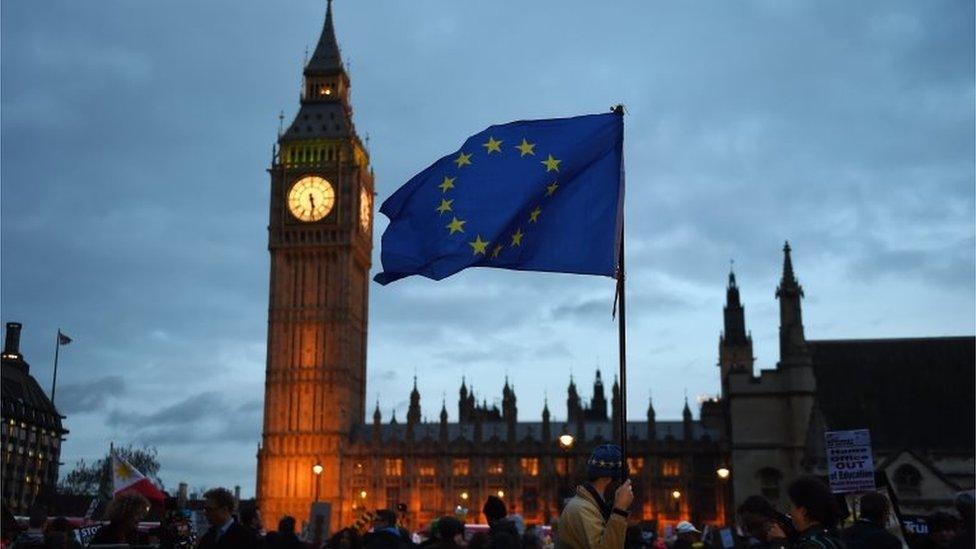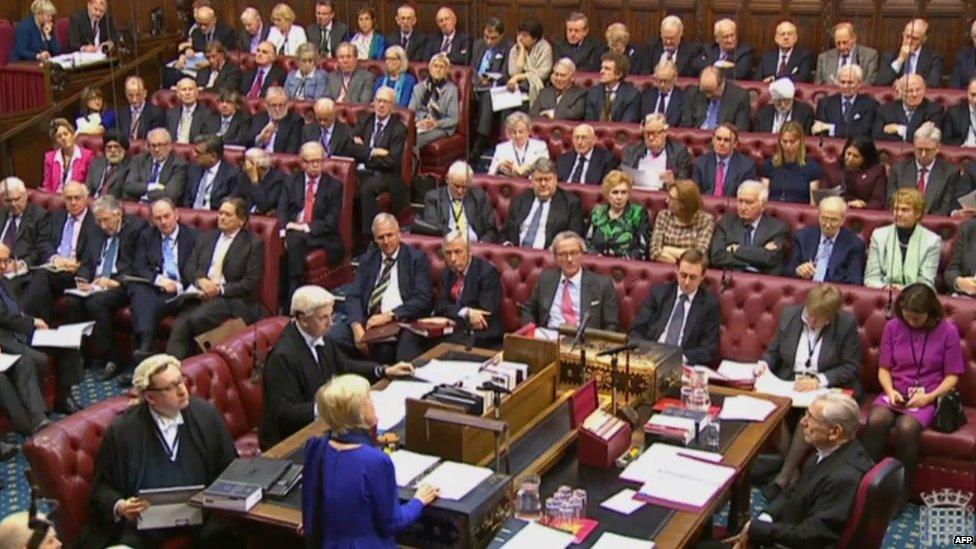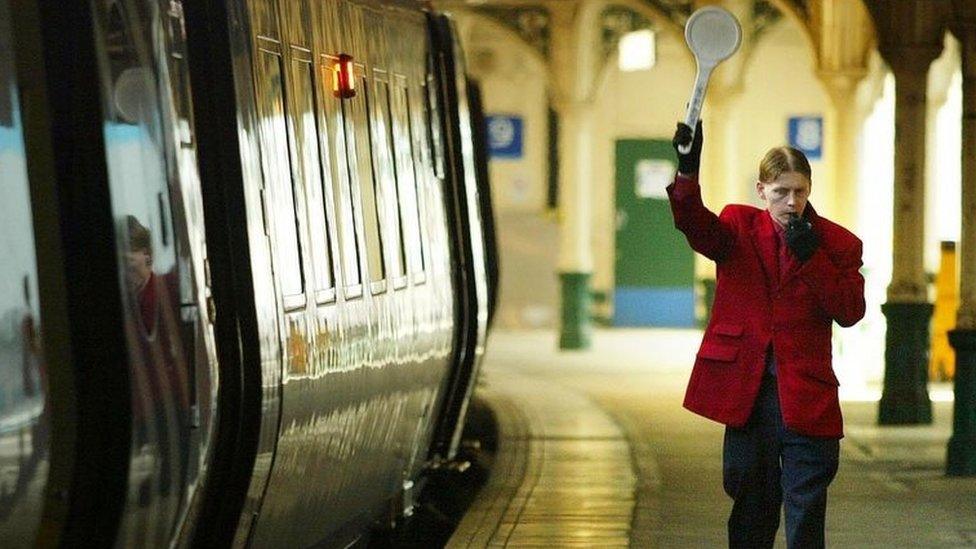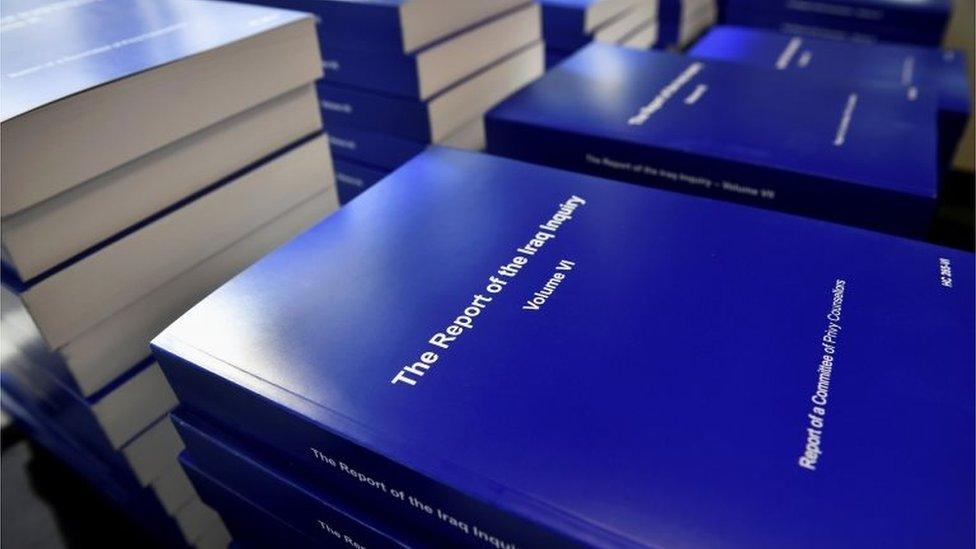Week ahead in Parliament
- Published
- comments

After six weeks of debate across both Houses of Parliament it looks like the Brexit Bill, the European Union (Notification of Withdrawal) Bill, external, which gives the prime minister the power to begin the UK's divorce from the EU, is about to complete its passage through Parliament.
It looks pretty certain that MPs will strike down the two amendments made to the bill in the House of Lords, on Monday afternoon, and that peers will then concede on both points later that evening - at which point the bill can be sent off to Her Majesty for the Royal Assent.
That could clear the way for a bit of drama, because the prime minister could then be in a position to announce she had served the UK's divorce petition on its EU partners, when she comes to the Commons on Tuesday, to report back on the latest EU summit.
We shall see, but I suspect the champagne is on ice in the government whips' office.
But after nearly six weeks of parliamentary sound and fury, the bill seems pretty certain to be un-amended, and the main interest in proceedings may well be the extent to which ministers give assurances on the two issues which provoked amendments in the Lords.
First, the position of EU citizens resident in the UK. Ministers have been adamant that they intend to guarantee their right to live and work here, and the most pro-EU Tory backbenchers accept their good faith, and will not rebel on this.
Second is the "meaningful vote" - the call for Parliament to be given a vote on the divorce settlement before it is put to the European Parliament, and in good time to be able to send ministers back to the negotiating table, if they don't like the deal.
Again, the possible pro-EU rebels in the Tory ranks are keener on getting assurances out of the Brexit Secretary, David Davis, than on backing a Lords amendment. And there is also some Brexiteer suspicion that the amendment passed by peers is in reality a trap designed to keep Britain in the EU if divorce talks fail to produce a settlement to the liking of Parliament.
And there's also a side battle for credit for any government concessions on either issue, with Labour plotting manoeuvres designed to show it was their efforts wot won any ministerial guarantees.
In any event, once MPs have pinged the bill back to the Lords, the expectation is that the critical mass of peers behind the original amendment will have eroded somewhat - the Crossbenchers seldom want to push the elected House of Commons too far, while Labour is engaged in an awkward balancing act between the pro-Leave and pro-Remain sections of its electoral heartlands, and may not wish to push its luck.
Which leaves the Liberal Democrats, who may well force a vote, but who don't have the numbers to win it. So that will be that.
Meanwhile there's some significant action elsewhere - perhaps the biggest defeat the government may suffer next week could be on the immigration status of students, in a key amendment to the Higher Education and Research Bill - watch this space.
Here's my rundown of the week ahead:
Monday

The Commons week opens (2.30pm) with Defence questions.
The day's Ten Minute Rule Bill looks particularly interesting and contentious. Labour's Diana Johnson is proposing to remove the criminal law underpinning of current abortion legislation.
Abortion is a criminal offence under the 1861 Offences Against the Person Act, external, unless conducted under the strict rules set in the 1967 Abortion Act....which means that a woman who buys pills on the internet to induce a miscarriage is committing an offence that potentially could lead to life imprisonment.
Similarly, a doctor conducting an abortion without meeting the terms of the 1967 Act, with two doctors signing off on the procedure could also face jail. She argues the criminal law should not be used, for example, against a woman in an abusive relationship who did not want a pregnancy, and that professional bodies like the GMC would be better placed to discipline doctors who broke the rules.
And she adds that a change in the law is supported by the Royal College of Midwives. But expect a pro-life MP to oppose the bill, and force a vote.
Then the House will deal with the amendments made by peers to the European Union (Notification of Withdrawal) Bill (see above). And after that, MPs continue the Budget debate. Watch out for ministerial smoke signals about the controversial proposed changes to National Insurance for self-employed people.
In Westminster Hall (4.30pm) MPs will debate e-petition 166711, external to "April's Law" signed by 126,070 people, on sentencing for child abuse offences - it calls for the government to make all sex offenders remain on the register for life no matter the crime, and for internet service providers and search engines to be better policed regarding child abuse images and for tougher sentences on those caught with indecent images of children.
In the Lords, from 2.30 pm, there's a great deal going on. The Article 50 bill is expected back from the Commons at about 8.30pm (see above) but before that there's some significant action on the report stage of the Higher Education and Research Bill, external (day 3).
The government's already been defeated five times on this bill, which has now been extensively rewritten since arriving in the Lords. And the process isn't over yet.
The remaining issues include preventing retroactive changes to student loan arrangements, and a cross-party new clause (signed by, amongst others, Lord Patten of Barnes, the Chancellor of Oxford University) which states:
"the Secretary of State shall ensure that no student, either undergraduate or postgraduate, who has received an offer to study at such a higher education provider, be treated for public policy purposes as a long term migrant to the UK, for the duration of their studies at such an establishment."
If passed, this could give the government an awkward moment when the bill bounces back to the Commons to allow MPs to consider amendments made in the Lords - 36 Conservatives have signed a letter to the prime minister supporting the change, and MPs are under considerable pressure from higher education to ensure they can continue to attract foreign students and academics.
There's also a new clause from the Crossbencher Baroness Deech on freedom of speech in higher education, the Lib Dem Lord Storey to create a new offence of providing or advertising cheating services and his party colleague Lord Sharkey is pushing for Sharia-compliant student finance.
During the dinner break, there will be a short debate on combating neglected tropical diseases since the London Declaration on the subject, which committed signatories to action against Guinea worm disease, lymphatic filariasis, leprosy, sleeping sickness (human African trypanosomiasis) blinding trachoma, schistosomiasis, soil-transmitted helminthes, Chagas disease, visceral leishmaniasis and river blindness (onchocerciasis). Former Lord Speaker Baroness Hayman leads proceedings.
Tuesday

The Commons opens (11.30am) with Business, Energy and Industrial Strategy questions. Then comes an intriguing Ten Minute Rule Bill from the Conservative Nusrat Ghani to encourage the diplomatic service to purchase wines and sparkling wines produced in the United Kingdom and to serve them at overseas functions and events
Then, the prime minister is expected to report back on the latest EU summit - will she be in a position to announce that she has served formal notice on the EU that the UK wishes to leave?
That is followed by the conclusion of the four-day Budget debate.
In Westminster Hall (9.30am- 11am) there's a debate on budgets for health and social care - part of the continuing campaign by a triple alliance of the Public Accounts, Health and Communities and Local Government Committees to highlight their concerns about the sustainability of the NHS budget in England - so watch out for contributions from the PAC's Meg Hillier, the Health Committee's Dr Sarah Wollaston and the DCLG Committee's Clive Betts, challenging the government on its Budget pledges to provide temporary funding boosts to social care and NHS capital funding.
Other subjects debated include the future of food labelling (11am-11.30am); detention of vulnerable persons (2.30pm-4pm) and dog fouling (4.30pm-5.30pm).
My committee picks are the Public Administration and Constitutional Affairs hearing (10am) with three party leaders of the House of Lords: Baroness Smith of Basildon (Labour), Lord Hope of Craighead (convenor of the Crossbenchers), and Lord Newby (Lib Dem), to identify the "unarguable next steps" for reforming the Lords. They will be quizzed on when it is appropriate for the Upper House to exercise its powers, and how, as a revising House, it can be made smaller and more effective.
And watch out for another example of cross-committee co-operation as Education and Health select committees combine (2.30pm) to take evidence on child mental health - examining the role of education in promoting emotional wellbeing in children and young people and preventing the development of mental health problems.
The session will hear from psychologists, head teachers and campaigners, including Professor Dame Sue Bailey, Chair of the Children's and Young People's Mental Health Coalition, Sarah Brennan, Chief Executive of Young Minds, and Dr John Ivens, head teacher at the Bethlem and Maudsley Hospital School.
In the Lords (2.30pm) the main event is peers' debate on the economy in the light of the Budget.
And there will also be a short debate on undertakings made in Our Commitments to you for end of life care: The Government Response to the Review of Choice in End of Life Care, external - led by Baroness Finlay of Llandaff, who is a professor of palliative medicine.
Wednesday

The Commons opens (11.30am) with Northern Ireland questions - which, given the political upheavals following the latest assembly elections, will be closely scrutinised for hints of the government's and the parties' attitudes.
Prime Minister's Questions follows at noon, and then comes a Ten Minute Rule Bill from the SNP's Drew Hendry, which aims to transfer Network Rail's land and assets in Scotland to an agency controlled by the Scottish government - on the argument that they have responsibility for rail services, but have to deliver any improvements through Network Rail, so they cannot control costs. Apparently this has become quite an irritant.
A rather scrappy afternoon follows. There's provision for MPs to react to further Lords amendments to the Article 50 Bill, if it is still in play, and they will also deal with Lords amendments to the Health Service Medical Supplies (Costs) Bill, external, and MPs will also polish off their consideration of the National Citizen Service Bill, external.
There's also a motion relating to appoint a new set of lay members to the Commons ethics watchdog, the Committee on Standards, external. The will have the ability to make their concerns known if they believe the committee has, for example, been too lenient on some erring MP.
In Westminster Hall, watch out for the debate on maternity discrimination (9.30am -11am). This will be the start of a two-week long campaign leading to Mother's Day and campaigners including Labour's Sarah Champion will be highlighting that 54,000 women a year are forced out of work because they are pregnant.
Other debates include: police widows' pensions (11am-11.30am); the cost of GP indemnity in England (2.30pm-4pm) and the implications for the Scottish devolution settlement of triggering Article 50 (4.30pm-5.30pm).
My committee pick of the day - inevitably - is the Exiting the European Union hearing (9.15am) with the Brexit Secretary, David Davis.
In the Lords (3pm), the main events are the third reading of the Neighbourhood Planning Bill, external - expected to be a rapid rubber-stamping - and the fourth day of report stage debate on the Higher Education and Research Bill - where the key issues are likely to include the research aspects such as the business focus of Innovate UK, UKRI regard for institutional autonomy, and the Haldane principle.
Thursday

The Commons opens (9.30am) with Culture, Media and Sport questions, and then, questions to the Attorney General. Next comes the weekly Business Statement from the Leader of the House.
The day's main events are scheduled by the Backbench Business Committee. There will be two select committee statements: first from Bernard Jenkin, chair of the Public Administration and Constitutional Affairs Committee, on its report on Lessons Still to be Learned from the Chilcot Inquiry, external, then from the Health Committee Chair, Dr Sarah Wollaston, on its report on Suicide Prevention, external.
The rest of the day is devoted to a six hour debate on a motion from the Conservative, John Penrose, Labour's Caroline Flint and the SNP's Patricia Gibson, deploring the big six energy firms' treatment of out-of-contract energy customers on default tariffs.
With energy bills taking an ever increasing share of the incomes of the poorest households, the motion calls for immediate action to protect consumers from being marooned on expensive default tariffs and calls on the industry, regulators and the government to consider solutions which recognise that many people lead busy lives where switching their energy supplier may not always be a high priority.
In Westminster Hall (1.30pm) MPs debate the Transport Committee's report on improving the rail passenger experience, and then Jobcentre Plus office closures (3pm).
In the Lords (11am) questions to ministers include one from Lib Dem superlawyer Lord Lester on the introduction of legislation to give effect to the judgments of the European Court of Human Rights on prisoners' voting.
Then, peers consider three orders on combined authority arrangements for Barnsley, Doncaster, Rotherham and Sheffield; for Liverpool City region; and for Tees Valley. The main business for the day is a debate on the Commonwealth and the importance of strengthening the UK's relations ahead of UK hosting the Commonwealth Heads of Government summit, in 2018.
Neither House sits on Friday.